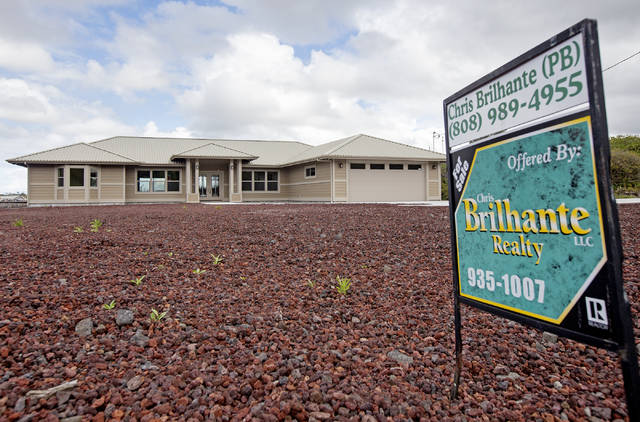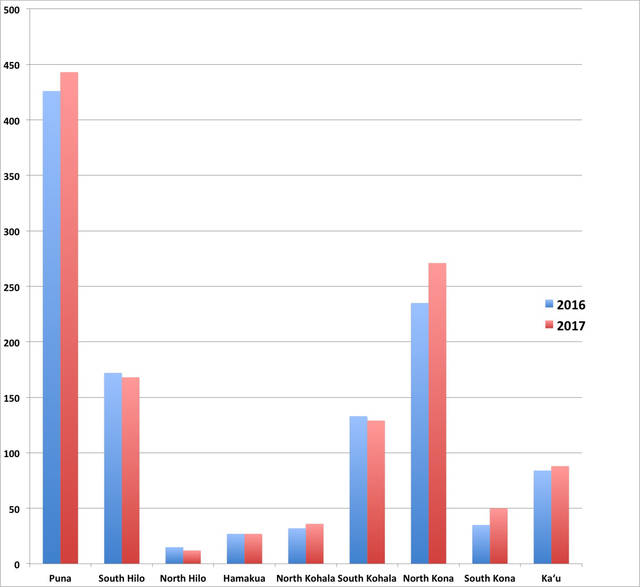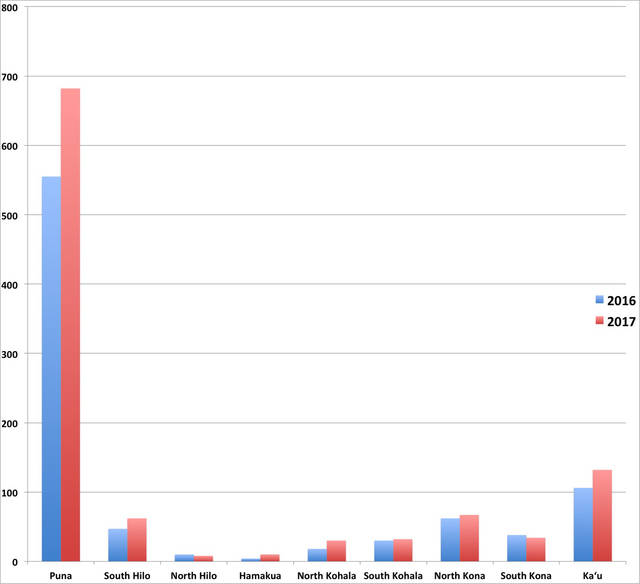Hawaii County real estate trends continued ticking upward as the first half of the sales year came to a close, with the busy market leading to increases in new construction as existing inventory is bought up. ADVERTISING Hawaii County real
Hawaii County real estate trends continued ticking upward as the first half of the sales year came to a close, with the busy market leading to increases in new construction as existing inventory is bought up.
Residential home sales increased 5.6 percent over last year’s numbers, and the median sales price for Hawaii Island homes is up 6 percent, to $346,775.
“The prices are going up because we’re running out of inventory, so people can ask for a higher price,” said Realtor Pat Halpern of Clark Realty Corp., who is president of the Hawaii Island Realtors Association. “We haven’t gotten yet to the point where we’re having bidding wars, but we’re starting to have sellers who are more firm in their price.”
Buyers tend to enter the real estate market with the expectation they will be able to negotiate, Halpern said, and “We as agents tend to think the same.”
The days of finding an inexpensive home because of foreclosure are gone, she said.
North Kohala remains the most expensive district, with a median home price of $625,000. At the other end of the spectrum, the median Ka‘u home price is $175,000.
Places such as Puna are seeing jumps in new construction, particularly in Hawaiian Paradise Park, Ainaloa and Orchidland.
In these areas, prices for new builds are starting to plateau, according to Realtor C. Kapono Pa of Savio Realty Ltd.
“Earlier we were looking at new homes that were over $300,000, and now it seems to be pulling back a bit,” he said. “In HPP and Ainaloa, new homes that are three bedroom, two bathroom are going for just over $200,000.”
The median sales price for Puna was $217,000 for the first half of the year.
And as has been the case since the market started to rebound from the recession, Puna also leads the way in the number of sales: 443 residential properties to date, or more than a third of sales islandwide.
“Paradise Park seems to be the hottest, still,” Halpern said.
Puna dominated sales of vacant land as well, with 64 percent of the market.
Pa said activity also was increasing in Hamakua, where land sales were slow last year.
Overall, vacant land sales are up 20 percent over 2016 numbers.
“That’s because people cannot find the house they want to buy for the price they want to pay,” Halpern said. “For now, young people are starting to say, ‘Well, I’m just going to buy a lot.”
People purchasing vacant land tend to be younger or contractors who are planning to build later. Halpern said there also have been increases in homeowners buying the lots around their house.
“People want to preserve that peace and quiet that they’ve gotten used to,” she said.
“If a lot goes on the market next to them, they often try and pick that up. That’s more in Volcano than Paradise Park.”
Even with the uptick in construction, however, housing inventory itself is “still pretty low,” Pa said.
Halpern agreed.
“I’m worried about our inventory,” she said.
Still, with interest rates remaining “pretty reasonable,” she said the overall market would likely continue to grow.
“It’s still busy for sure; it hasn’t died down,” Pa said.
Email Ivy Ashe at iashe@hawaiitribune-herald.com.





